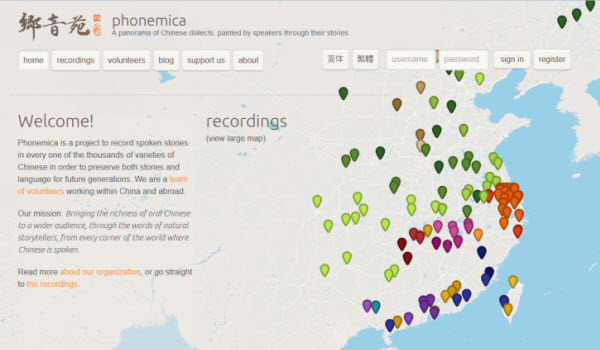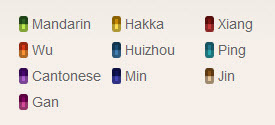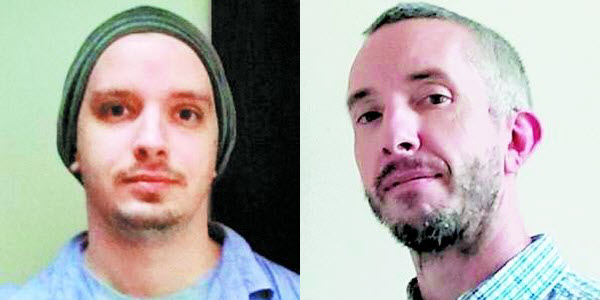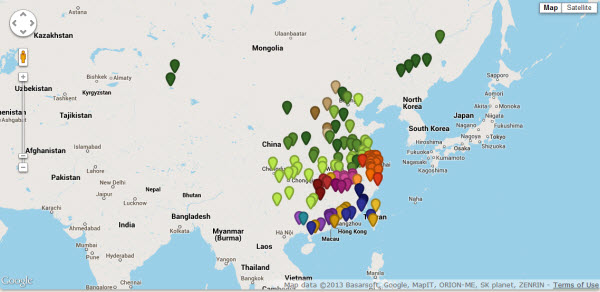On Sohu:
2 Americans Collect Dialects of Ordinary People to Build a Chinese Dialect Map
On the the dialect map that is Phonemica, green [icons] represents Mandarin, yellow represents Hakka dialects, blue represents Min dialects, orange represents Wu dialects, auburn represents Xiang dialects, rose represents Gan dialects, violet represents Cantonese, and brown represents Jin dialects. Click these icons and corresponding audio of these dialects will be played.
21-year old Miss Jiang is studying in Shanghai, has been in Shanghai three years now, and still does not understand Shanghainese. [When asked] to speak her hometown Changsha dialect, she cannot speak it fluently either, only able to speak Mandarin Chinese with a Changsha accent, “There’s nothing I can do, I’ve been speaking Mandarin ever since primary school.”
China possesses a myriad of dialects; nevertheless, with the government compulsively imposing Mandarin in school and public institutions, the room for a dialects’s survival seems to be getting smaller and smaller. For example, in Shanghai, many of the younger generations are unable to accurately converse in the traditional Shanghainese dialect that older generations speak, and this issue is widespread in other dialect-speaking regions [in China].
However, two people who aim to solve the problem and [actually] “do something” are two Americans. In 2009, Kellen Parker and Steve Hansen launched a website to preserve and record “disappearing dialects” called Phonemica.
Kellen Parker [pictured above, left] is a graduate student in the linguistics department of National Tsing Hua University, Taiwan. [his concentration] is Historical Development of Chinese dialects. Before arriving in Taiwan, he lived in the Yangtze River region in China, where he began familiarizing himself with the Chinese language and its many dialects; Steve Hansen [pictured above, right] is the co-founder of the Chinese linguistics blog Sinoglot. He achieved proficiency in multiple languages, including Chinese, Spanish, Korean, and Latvian. He has lived in Beijing for a couple of years, and by relying on his social connections, he set up numerous interviews for “Phonemica”. He thinks Beijingers in general lack an awareness of other Chinese dialects. “Beijingers are like New Yorkers, ” he joked, “they think they are the center of the world.” Hence, they are unfamiliar with other dialects. Hansen says frankly, they always think of Mandarin spoken with a regional accent as a “dialect”.
The most distinguishing feature of Phonemica is the “linguistics map”, which provides the audio of a dialect from a certain region represented on the map. By clicking the icons on the map, [people] can listen to the audio and obtain access to relevant information, including the speaker/storyteller’s name, age, hometown, and the region of the dialect spoken. Most audio tracks are recorded in forms of stories by local people, and the length [of the audio] is roughly around five minutes long. The website was officially launched in April 2013, and currently the website has 85 audio tracks available with topics ranging from young people talking about their favorite Chinese stars to grandfathers recalling working in rural lands during the Cultural Revolution.
61-year-old Mr. Xie from Pingtung, Taiwan told a story in the Sixian [Fourth County] Hakka dialect. Parker says the number of people who use the Hakka dialect as their native tongue exceed 30 million, but today much fewer people speak the Sixian Hakka dialect, and most of them dwell in northwestern Taiwan. 50-year-old Song Hongcheng, from Hubei Fang County, told a story in the Fang County dialect. Fang County dialect is a branch of Central Plains Mandarin, with 300 thousand people speaking the dialect today. The website is completely open to the public and, at present, it is also in the process of collecting audio tracks of dialects from volunteers. In the past week, the website received several tracks from Baoji-Shanxi, Xinhua-Hunan, and Gaoping-Shanxi.
The first concept of a “dialect map” can be found at George Mason University’s Speech Accent Archive in Virginia. The archive features recordings of hundreds of English speakers’ accents ranging from Brooklyn dwellers to German descendants in Pennsylvania reading the same paragraph. Parker and Hansen think recording family history through the “Story Corps” method is also very meaningful. “Story Corps” is an archive that contains 45,000 stories passed down by word-of-mouth amongst the American people.
Today, most of Phonemica’s operations still heavily rely on the support of social networks, as it uses social networks to recruit volunteers. Volunteers categorize and edit the stories collected online. Hansen estimates future interviewees of Phonemica might include immigrant communities (overseas Chinese) who have never lived in China. In fact, “the map on the front page of the website possesses an undefined Chinese border, already demonstrating Phonemica’s interest in exploring how people speak Chinese outside of China.” Up until now, most audio tracks collected are from coastal regions, [but] Hansen adds that in the future, even Chinese speakers from Singapore and Mongolia will be able to tell their stories.
China too has many websites and forums that are dialect-related, but most websites are limited to textual material, and a systematic audio information collection is rare, with most being used for professional research. Phonemica mostly collects stories spoken in different dialects from ordinary people. “Fundamentally speaking, we want to record Chinese people’s [vernacular] dialects that they use at home through the stories told by the interviewees,” Parker says. He adds, “while recording dialects, we are also making/recording Asia’s oral history.” Next to every story’s audio track, Phonemica attaches relevant ethnographic background, such as photographs, hometown, academic degree, etc. which makes it [Phonemica] more approachable and more interesting than its professional academic research website counterparts.
Comments on Sohu:
Ida863在搜狐:
Why is the Chinese people’s linguistics map mapped by foreigners? Just like how China’s Kungfu Panda was made by foreigners.
闻风而动:
This is of great significance, but [I] feel a bit awkward. Logically, this duty belongs to our linguistics experts and relevant departments, but two foreigners have stolen the thunder. Should we commend the two foreigners, or should we scold our relevant departments?
搜狐新闻客户端网友:
Actually, China has had experts and scholars propose saving dialects long ago. Government ministries also introduced regulations to preserve dialects. It’s just that regrettably people do not see their efforts. In many of our countrymen’s eyes, everything foreign is good.
搜狐新闻客户端网友:
While others are improving their own cultural awareness, there are still so many Chinese people here showing our countrymen’s low characters, can we please not be like this? You can see the speck of sawdust in another’s eye but cannot see the plank in your own eye? When you criticize others, reflect on yourself first!
浮华落尽5491:
Chinese people don’t do it themselves, and must rely on foreigners.
Dialect is also a form a culture, something [we Chinese] should never abandon.
爱我中华:
What these two American men did is worth learning from by relevant China’s relevant departments! China’s various regional dialects should be collected and organized by Chinese people themselves, and should not and shouldn’t need to be stolen or collected by foreigners. Especially not stolen by Americans who suppress China, as the Chinese people do not welcome you! Do not provide information to them! Chinese dialects do not need to be managed by Americans!
慎而思之53328580:
Spies!
我一个人容易吗:
Hahaha [you think] it is easy for Americans to collect Chinese dialects? They put so much effort into [researching] China, what else can you say? Why don’t you go to the U.S. and collect all the American dialects!
风情万种58393441:
These are obviously spies.
搜狐新闻客户端网友:
Warning: Note that this could be an operation officially supported by American authorities, to understand Chinese dialects, laying a foundation and doing research for future warfare, [as] previously our national dialects played a key role in wars.
千晚夜1991在搜狐:
One look at these two pictures and you know they are up to no good.
华夏3金:
Should we have two Chinese go put together a map of American dialects?
搜狐新闻客户端网友:
This method of linguistic research is worth learning from! It does not matter who thought of this good idea. As long as it can be used in preserving dialects, [it] should not be delayed anymore.
搜狐新闻客户端网友:
This is to establish a database of China’s regional dialects for America’s intelligence agencies. [I] suggest [China’s] national security department investigate this case. [If you] have seen the American movie Windtalkers you would know what is at stake.
搜狐新闻客户端网友: (responding to above)
2b, you’ve only seen this one movie your entire life, right, [you are] depending on this movie. If others really wanted to steal intelligence from you, would they still let a loser like you know about it? You are taking yourself way too seriously. You even mention Windtalkers, how embarrassing.
搜狐新闻客户端网友:
Be on the guard for what? The Chinese government does not protect [preserve these dialects], and these people are kindly recording them down for you. Just look at our native tongues and how they are being spoken by fewer and fewer people, isn’t that sad?
星耀初夏52516736:
With our Heavenly Kingdom having so many dialects, where there could be a different accent just on the other side of a mountain, by the time you finish collecting all these, 50 years will have passed.
搜狐网友60206394:
This involves national security. It must not be allowed. It should be carried out by our own linguistic specialists, state funded and state controlled.
搜狐新闻客户端网友:
Yeah yeah yeah, people who volunteered in Africa were doing so to steal genome maps, and the teaching of impoverished kids was for cultural imperialism. Even setting up a telescope was to peek at aliens having sex. In your eyes, there are no good people in the world.
搜狐新闻客户端网友:
I only want to say: China cultivates many experts and professors, so many scholastic research institutes, yet none of them have any damn use! China is really damn sad! No wonder Korea claimed Confucius is theirs! They have a point.
搜狐新闻客户端网友:
From a linguistic perspective, they did a good job protecting linguistics diversity. They applied ethnographic research methods.
搜狐新闻客户端网友:
Did America’s wiretapping encounter linguistic difficulties?
民主自由联盟:
Dialects should have been discarded in the trashcan of history long ago.







138 Comments
Leave a Reply2 Pings & Trackbacks
Pingback:How Technology Is Helping People Learn—and Even Save—the World’s Languages · Global Voices
Pingback:Technologie: Hilft beim Lernen und bewahrt die Sprachen dieser Welt · Global Voices auf Deutsch